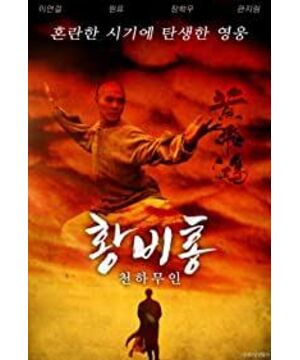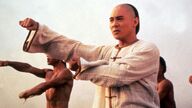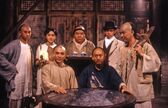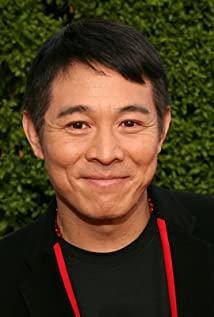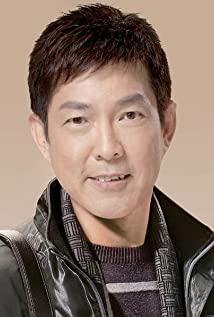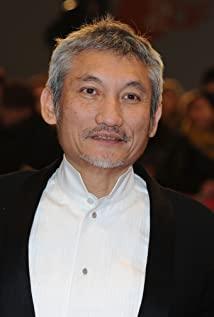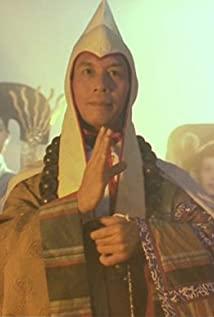In fact, even the martial arts part, the rain battle with Yan Zhendong and the warehouse ladder battle are enough to have a place in kung fu movies, but if only "Huang Feihong" is classified as a kung fu movie, Tsui Hark would be underestimated. What really makes the "Huang Feihong" series higher than similar films is the in-depth reflection on the background of the times in addition to the traditional confrontation between good and evil. At that time in China, the ports were full of foreign ships, foreigners had already set up restricted areas in Chinese cities, and Western civilization had begun to invade China. Coupled with the incompetence of the Qing government and the ignorance and indifference of the people at that time, it could be said that it was subsequently invaded by the Allied Forces of the Eight Powers, betraying power and insulting the country. The situation is already unstoppable. In this context, the characterization of the characters in the film can be said to fully reflect the mood of the characters at that time.
For example, the admiral who represents the Qing government is basically a foreigner’s dog-leg, and the current national crisis is still busy fighting in the nest; the thirteenth aunt and Ya Chisu represent Chinese who have returned from studying in the West and have received advanced education, but the two are different. The thirteenth aunt is out there, she just wants to come back to find the beloved Huang Feihong, and besides the avant-garde thinking, she also has the various virtues of traditional Chinese women, and Yajiasu stays out for a long time, even Chinese. To say that it is not possible, after seeing a series of setbacks, he cut off his braids. If it were not for Baozhilin's disaster, he would probably have left as soon as he was, and he would be completely disappointed in China. The Shahe Gang is a traditional bully. He understands that the change of the times only cares about his own interests; Yan Zhendong represents the traditional warrior, but even when the times have changed, he still only wants to make a name for himself by martial arts. It can be said that not advancing with the times has ruined his life. Liang Kuan is a typical little person. He didn't know where to go in the face of the big time. He went astray for a time. Fortunately, he was kind and repented in time and finally fell under Huang Feihong's door. This was the way he was completely right.
And it is the limitations of these people that show the greatness of Huang Feihong. It stands to reason that the traditional Chinese medicine and martial arts he is good at are the most traditional Chinese culture, but under the oppression of Western civilization, he did not blindly resist, but tried to learn from other people's strengths with a rational attitude. Although, for example, in the Lion King Contest, he would be jealous and not learn advanced technology because of his jealousy. Although he also made a lot of jokes about learning foreign languages and guns, in general he saw the reason why the West is leading the way. , So even though he still resisted foreigners, he was still willing to keep up with the development of the times and learn from each other's strengths. It was too rare for a knight like him in the era at that time. Of course, this is also inseparable from the influence of the people around you. Needless to say, the thirteenth aunt who returned from studying abroad, including the Lion King’s battle for hegemony, can also see that his father is also a model father who does not obey the old rules and keeps pace with the times. Yan Zhendong died. The previous sentence, no matter how good our skill is, can't match foreign guns and guns. When the Chinese people stood up to testify for him when they were afraid of things and indifferent, even the missionaries who blocked his guns in the end promoted his own growth and choice. Looking at these few Huang Feihong, he strictly adhered to the rules of generation from the beginning, did not dare to think about the thirteenth aunt, slowly broke the stereotypes, faced his heart, learned to wear a suit, put on sunglasses, and learned about steam engines and cameras. The usage of, its own change of attitude towards Western civilization is also completely portrayed step by step. What's more, in this process, he still retains the traditional principles, is courteous and courteous, is neither humble nor overbearing to all forces, and treats each other with courtesy. He is really a great chivalrous man.
At the end of the film, the admiral asked Huang Feihong if there is Jinshan in the end, Huang Yixiao: If there is Jinshan, will they still come to China? What a simple truth, but the people at that time were so uncivilized. Not talking about the martial arts realm, but only talking about the understanding of the times, if half of the people in the country could be as thorough as Huang Feihong, China would have been saved long ago. The height of martial arts is also proportional to the inner realm. The reason why Yan Zhendong, who only has kung fu in his heart, is still inferior to Huang Feihong in martial arts. , Talents have a higher view of martial arts and life than ordinary people. Finally, when Liang Kuan was apprentice, Huang Feihong changed into a suit made by the thirteenth aunt, but Fang Jiasu, who had always been in the dress, changed back to a Chinese gown. This is also a wonderful topic. Huang fully realized that only Kungfu can no longer resist the invasion of Western powers. Only by applying what he has learned can he be self-reliant. Ya Chisu was also convinced by his master's character, martial arts and realm, and rekindled hope for China and returned to his lab coat.
It may be a little regrettable that Jet Li was injured at the time of the last ladder battle and had to be replaced by Xiong Xinxin. Therefore, some long-range lenses were inevitably used. In fact, some shots can still see Xiong Xinxin's face. If it is Li Don't hurt, maybe this battle will be more classic. I have to say that when Jet Li had a righteous and handsome face when he was young, he put up his hands and added a self-improving BGM, Huang Feihong, since then, no one can match the spokesperson of the hero.
Tsui Hark’s Huang Feihong series has been filmed for a total of five parts. The fourth "Wind of the King" although Huang Feihong was replaced by Zhao Wenzhuo, and the overall level is a little bit worse than the previous three, but the portrayal of the background of the times is still in the same line as the previous three. I also regard this movie as the ending of Tsui Hark’s version of Huang Feihong. In the end Huang won the lion match with foreigners, but learned that the capital had fallen, and even Lafayette ran away. He really won a game, but lost the whole game. war. In fact, throughout the series, Huang Feihong’s attitude towards Western civilization is obvious to all. He has done a lot of good things that have affected many people, but he is still unable to change the fate of the ultimate fall of the country. This has to be said to be the tragedy of the times. A hero has nothing to save. As for the entire series, Huang Feihong, who is struggling in the face of national disasters, has become one of the most classic characters in Chinese film history. This is undoubtedly the pinnacle of Jet Li and Tsui Hark.
As a digression, Xiong Xinxin, who stands for Jet Li, actually starred in all three Jet Li’s Huang Feihong, and they played different roles. The first one is just a thug in the Shahe Gang, and the second one is already a boss of the Bailian Sect, which is similar to Huang Feihong A classic play, and the third one turned into Ghost Foot Seven, this is another classic apprentice image of Huang. Including Liu Xun, who later played Huang Feihong’s father, also played Master Liu in the first part, and Ren Shiguan, who played Yan Zhendong in the first part, played an admiral again in the second part. The same actor plays different roles in the same series. The anecdote of the character can be regarded as an extra little fun of watching Huang Feihong series.
View more about Once Upon a Time in China reviews


